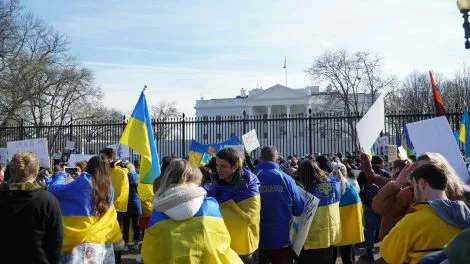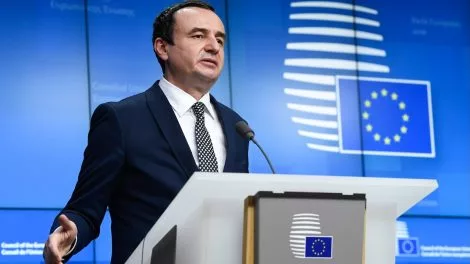NATO, when it wants to, can act very quickly. Less than a week after the Greek parliament voted to sign off on the deal that will see the Republic of Macedonia officially become the Republic of North Macedonia, NATO approved the newly-renamed country’s accession protocol. Once the protocol is signed by NATO’s existing 29 members, North Macedonia will be able to take part in the organisation’s activities as an invitee. Full membership should be possible by the end of 2020.
The markets have reacted positively. North Macedonia’s 2025 sovereign bond hit a one-year high as NATO Secretary General Jens Stoltenberg welcomed the final confirmation of the so-called Prespa Agreement as “an important contribution to the stability and prosperity of the whole region.”
Ancient heritage
The name Republic of Macedonia was adopted immediately after the country declared independence from the former Yugoslavia in 1991. It had been recognised as such by more than 130 countries, but not by the United Nations, NATO or the European Union, in all three cases because of the objections of Greece, which claimed that the term ‘Macedonia’ usurped its own ancient heritage and implied territorial ambitions on its northern province of the same name, the birthplace of Alexander the Great.
The 27-year-long dispute was finally resolved in June 2018 when, after months of often delicate negotiations, Macedonian Prime Minister Zoran Zaev and his Greek counterpart Alexis Tsipras signed an agreement in the town of Prespa, which sits on the border between the two countries.
“This agreement preserves the Macedonian ethnic and cultural identity,” said Mr Zaev at the time. “Both our language and our people will continue to be known as Macedonian.”
While there was broad popular support in Macedonia for the Prespa deal, not everyone was happy. The opponents of the agreement were led by the country’s president, Gjorge Ivanov, who went so far as to call for a boycott of a referendum on the deal from the pulpit of the UN General Assembly in New York, claiming that it was “a flagrant violation of sovereignty.”
Russia was also less than pleased.
Prespa has unquestionably raised tensions between Russia and the West, exacerbated by Montenegro joining NATO in 2017 and leaving, once and for all, Russia’s circle of influence. “Moscow now sees Macedonia as crucial,” says Blerim Reka, a professor at the South East European University.
Russia invested heavily in the referendum. “The Russian propaganda machine was running at full steam,” says Mr Reka, “mostly through Serbian media, including the Belgrade offices of the Sputnik news service and the RT (formerly Russia Today) television network. Hundreds of anti-referendum websites popped up and began disseminating misinformation. Such activity did not go unnoticed: the US Congress allocated eight million US dollars for Macedonia to fight Russian disinformation campaigns.”
At what cost?
Mr Ivanov’s calls for a boycott and Russia’s interference in the referendum did not, ultimately, matter. While turnout was low – below the threshold that would have made its result binding – Mr Zaev was over the following months able to push the name change through a fractured parliament despite the opposition of nationalist parties and the president.
The biggest question now, however, is at what cost did he do so? Mr Zaev was forced to make a number of concessions to opposition MPs, some of which could place new obstacles on North Macedonia’s path towards the EU, freshly cleared of a Greek veto.
“North Macedonia’s EU accession will take far longer than NATO membership,” Maximilien Lamberston, a leading analyst at the Economist Intelligence Unit, told Emerging Europe. “While Greece will remove its veto on opening accession talks, there is still a risk that the European Commission does not recommend opening talks with North Macedonia in June this year. This could either be due to anti-enlargement sentiment deepened by eurosceptic parties performing well in the May European parliamentary elections or due to concerns that North Macedonia has made insufficient progress on improving the rule of law. Paradoxically, the political bargaining involved in passing the constitutional amendments to change Macedonia’s name (which it did to unlock EU accession), included granting amnesty to opposition MPs facing trial, which critics say undermined the rule of law and judicial independence, key requirements for EU membership. However, it would be a blow to Zoran Zaev if the EU were to demand more reforms before even opening negotiations, given the political capital Mr Zaev spent in changing his country’s name.”
A major win for the West
There are also concerns that Russia, whose opposition to Macedonia’s NATO membership remains, may make one final attempt to throw North Macedonia’s plans off course by using its UN Security Council veto to torpedo the new name.
Russian Foreign Minister Sergei Lavrov implied that it would do just that shortly after the referendum last year, when he stated that the new name would have to be reviewed by the Security Council under Resolution 845. It has yet to comment on the Greek vote, but as the American analyst Janusz Bugajski has noted, “Moscow sees its stronghold in Macedonia in [the context of] its fight against the EU and NATO” and wants to turn it into “another Republika Srpska entity” – the autonomous, pro-Russian region of Bosnia and Herzegovina, which has worked to keep that country out of Euro-Atlantic structures.
For all Russia’s anger at the deal – indeed, perhaps because of Russia’s anger – Prespa needs to be viewed as a major win for the West. Not that it will not have time to congratulate itself. North Macedonia needs more than just vague promises from its allies over the next few months.
An Open Society Foundations report, published shortly before the Greek vote, outlined the potential for disaster: “If the EU is reluctant to unblock Macedonia’s EU accession path, even after the Prespa deal, then we return to the situation before the European political re-engagement of 2017 – where the Kremlin was free to spread its influence in the Western Balkans unhindered.”
North Macedonia will hold a presidential election in April, and an early parliamentary election will almost certainly follow later in the summer. Should ordinary Macedonians see no immediate benefit from the name change – which many supported with a heavy heart – they may turn against Mr Zaev and his pro-European agenda in large numbers, ushering in a nationalist government that could halt the country’s progress towards the EU before it has even begun.
Published by: emerging-europe.com




